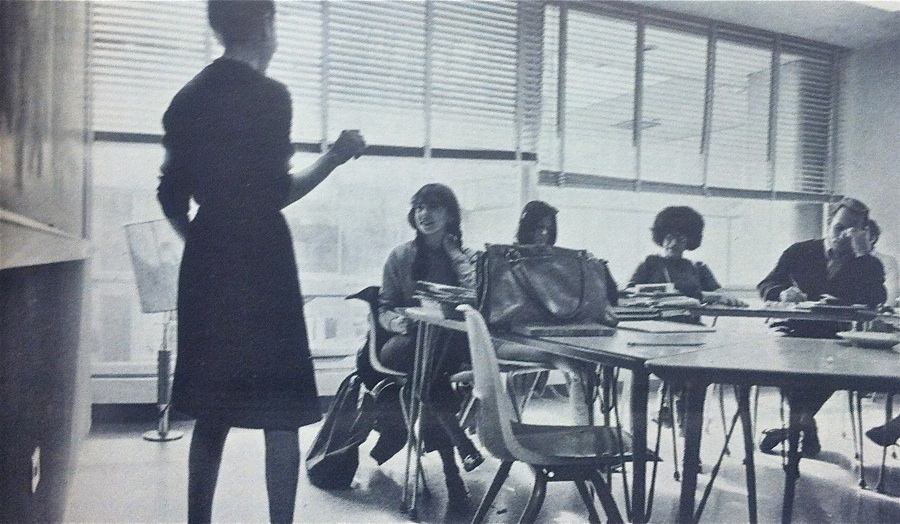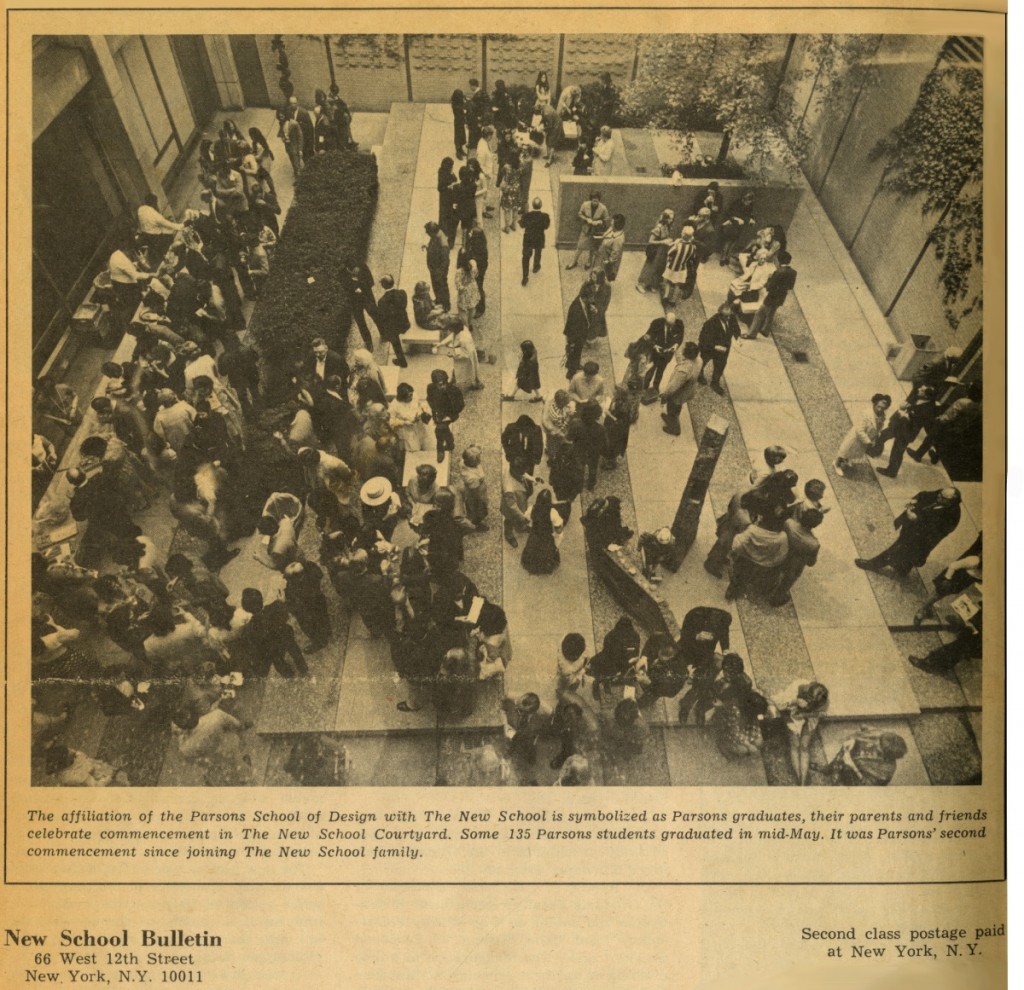Every day, Pamela Besnard, the vice president of development and alumni relations, spends her time flipping through paper files, scrolling through Excel sheets, dialing numbers, writing emails, or trolling through the school’s social networks. Along with her coworkers, Besnard is trying to help the university do something that it hasn’t always done well: keep in touch with its past.

With assistance from the departments of academic technology and advancement services, alumni relations is trying to bring clarity and simplicity to what has traditionally been an “expensive” and “inefficient” endeavor. Before the creation of a central university alumni office in 2007, each division of The New School had its own alumni offices and handled its responsibilities in an uneven way. Some offices carelessly threw away their records, while others neatly kept and collected them, eventually passing them on to the new university-wide office.
Today, the university retains records of tens of thousands of alumni.
“In 2005, we were able to reach 67 percent of alumni by email, mail or phone. Today, including the thousands of students who have since graduated, that number is 80 percent of 60,000 alumni,” said Amy Garawitz, who became the director of alumni engagement last September.
The New School didn’t have a formal organization for former students until halfway through its institutional life. The first alumni association was founded in 1968 as a non-dues paying organization; all alumni are members of this group. Semi-dormant for years, it was recently revived and is now a key part of the university’s outreach efforts.
“The Alumni Association acts in support of the university’s mission of bringing actual, positive change to the world by facilitating meaningful lifelong relationships among the global New School community,” says the association’s website.
*****
Although the goal of the Alumni Association is to build life-lasting relationships between former students and The New School, many alumni say they have stronger relationships with their former professors rather than the institution itself. That informal network has been part of the school’s legacy for as long as the university has been around — but it makes it harder for the school to monetize the alumni-university relationship.
“We’ve had a huge turnover with the faculty in the last 10 years,” said Mark Larrimore, an associate professor at Lang for 15 years.
This flux has meant that the university has lost touch with a large number of alumni. Many former faculty members, added Larrimore, may be in touch with alumni — but the university is not.
Larrimore and Mark Statman, who has been an associate professor at Lang for 25 years, both hold close relationships with previous students. Last year they co-administered “Lang@25,” a Facebook page to facilitate the celebration of Lang’s 25th anniversary, which focused on locating and communicating with Lang’s first graduating class.
“Lang is a young school, and connections to faculty are always the deepest connection, at least at schools that foreground seminars and close intellectual relationships,” said Lang Dean Stephanie Browner. “At some schools the connections is deepest to the sports teams. Here it is to the faculty. That speaks to who we are.”

To facilitate outreach and a sense of community, the Alumni Association also created “@The New School,” an alumni newsletter that is sent to former students from every division. The first issue was sent out January 31st, and consisted of news, announcements and events. The association plans to send it three times a semester.
Garawitz, who led the organization of this online newsletter, was proud of its first release last month and encouraged by the number of viewers. The front page article was called “New Schoolers Dominate 30 Under 30.”
“It’s like a brag sheet,” stated Garawitz. “The early results are encouraging.”
This year, on April 28, The New School’s Alumni Association plans to host its first Alumni Day — an effort that the association hopes will bring alumni and faculty from all divisions. This day will highlight the best of the university through organized programs and events. Among the events will be panels and seminars like “Politics and Comedy” by Arien Mac, an NSSR professor, and a cocktail reception.
For those who won’t be able to attend, the New School has chapters — groups of alumni led by a volunteer in cities like Los Angeles, Philadelphia, Miami and New York.
A graduate of The New School and the chair of the Los Angeles chapter, Montrese Chandler believes that the school is doing a great job of engaging and connecting to their alumni.
“Having regional chapters also helps to engage the alumni community in development efforts, giving back both to the school and regional communities, as well as branding The New School,” said Chandler.
*****
Many alumni believe that The New School is doing a good job to reach out to them.
“I think the New School does a decent job to reach out to its alumni. Having a Facebook page and LinkedIn groups are the way I most often find out about NS alumni-related news,” responded Charlotte Gudmundsson, an ‘09 Parsons alumna, via email.
Although the university continues to increase their efforts, some feel the alumni community bears some responsibility, too.
“When the school reaches out to its alumni, the alumni needs to equally reach back,” said Jennifer Benetato, a ‘03 Lang alumna.
Some alumni choose not to stay in touch with the alumni office because they believe the office will constantly call them and ask for donations.
“One student was telling me that she hasn’t even graduated yet and somebody has already called her,” said Larrimore.
But Larrimore believes that those who currently work in development and alumni relations understand alumni’s irritations with constant contact.
According to Besnard, 90 percent of The New School is funded by student tuition. Based on alumni’s responses, alumni barely donate.
“I would only donate if I got something out of it!” wrote Gudmundsson.
*****
A sense of community is famously difficult to find at The New School, even among current students. Although alumni relations has streamlined and improved over the last 15 years, the school has a long way to go to inculcate a sense of community and loyalty among its former students.
One current sophomore at Lang, Alex Newman, believes developing a community is difficult since the educational experience at The New School is untraditional.
“Universities usually have ‘micro communities,’ like sports,” he said. “And since we don’t have any of that, students seem to bond over their studies, classes and majors.”
Although they did feel a sense of community and unity as students, some say, it dissipates once they leave the university.
“While in school I did sort of feel [a sense of community], but it was gone once I graduated,” said Guillermo Riveros, a Parsons ‘09 graduate. “The illustration program felt like a community because of the teachers and the students; the directors of the program were not helpful or interested in the students at all.”
For some, the question of what it means to go to The New School — a diffuse and varied university — has long been a source of bemusement and consternation. But by helping to develop a sense of identity for its former students, the university hopes to provide a way forward for its current students as well.
With reporting by Nick Gardner & Erika Vaatainen







Hello, I enjoy reading through your post. I like to write a little comment to support you.
naturally like your web-site but you need to check the spelling
on quite a few of your posts. A number of them
are rife with spelling issues and I find it very troublesome
to inform the reality then again I will surely come
again again.
hello!,I love your writing so much! share
we keep up a correspondence extra about your post on AOL?
I need a specialist on this space to unravel my problem.
Maybe that is you! Looking forward to look you.
Hi my loved one! I wish to say that this post is amazing,
nice written and come with approximately all vital infos.
I would like to peer extra posts like this .